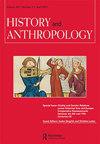民族主义与知识:他者与印度人类学的学科发展
IF 0.4
2区 历史学
Q3 ANTHROPOLOGY
引用次数: 0
摘要
本文章由计算机程序翻译,如有差异,请以英文原文为准。
Nationalism and knowledge: Othering and the disciplin(e)ing of anthropology in India
ABSTRACT This essay is about how Indian anthropology-sociology has historically theorized Islam and Muslims. In it, I demonstrate how anthropologists’ discourse on Islam and the majoritarian Hindu discourse on nation – Muslims being its constitutive other – dovetail into each other. Three main catalogues through which anthropology has dealt with Muslims are: silence, alienness and erasure. Against anthropology’s self-perception as the most reflexive discipline, I argue how Indian anthropology has been intertwined with nation-state as both an ideology and a set of practices. I also identify connections between symbolic violence of anthropology-sociology manifest in the othering of Islam and anti-Muslim political violence in postcolonial India. Discussing influential texts, schools of thoughts, departments, individuals, institutions, professional association in a framework that comparatively alludes to the ‘anomaly’ of Jews vis-à-vis German anthropology, this essay also charts out a different genealogy of anthropology in India, one that remains hushed in the regnant accounts. In so doing, it maps the discipline’s trajectory from its moment of formation to the present. One key aim of the essay is to unveil the theory behind methodological nationalism to discuss the (im)possibility of writing an alternative anthropology-sociology of India.
求助全文
通过发布文献求助,成功后即可免费获取论文全文。
去求助
来源期刊

History and Anthropology
Multiple-
CiteScore
1.80
自引率
0.00%
发文量
41
期刊介绍:
History and Anthropology continues to address the intersection of history and social sciences, focusing on the interchange between anthropologically-informed history, historically-informed anthropology and the history of ethnographic and anthropological representation. It is now widely perceived that the formerly dominant ahistorical perspectives within anthropology severely restricted interpretation and analysis. Much recent work has therefore been concerned with social change and colonial history and the traditional problems such as symbolism, have been rethought in historical terms. History and Anthropology publishes articles which develop these concerns, and is particularly interested in linking new substantive analyses with critical perspectives on anthropological discourse.
 求助内容:
求助内容: 应助结果提醒方式:
应助结果提醒方式:


